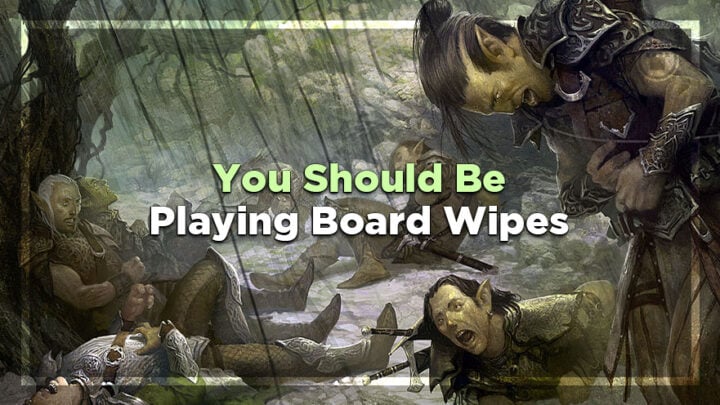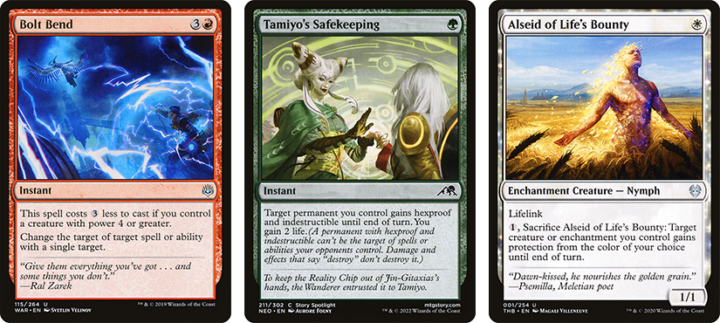Kristen sets out to get the record straight on board wipes. How many should you run? Should you hold back on casting them?
There’s been a lot of chatter in recent times around how many board wipes you should be playing in Commander. Whilst traditional deck building templates have indicated as many as five to seven board wipes, the current word on the street is that around three to four is enough. I’ve even chatted with people that believe one to two are more than enough, and it’s honestly tempting to drop that low in a creature-based deck.
Why the sudden shift, in the space of a few years?
PLAYING FEWER BOARD WIPES
The simple answer is that players have started to consider the overall play experience as a much higher priority than they used to. Generally speaking, most players have a “goldilocks” zone in which their enjoyment peaks, and that’s around the 90 minute mark, with games that go into the two to three hour territory being less enjoyable. Board wipes tend to drag a game out, by this logic, so including fewer in the deck means that games reach an endpoint quicker.
EDH players aren’t exactly known for their humble approach to group enjoyment, though, so what else is driving this decision?
Well, in a word: Content.

ENTERTAIN ME
Content creation has been at the forefront of this change, and as often as jokes are made about the “Ivory Tower” that content creators sit in, I do want to seriously consider that the meta that content is made in is different from the meta that you play in. The goals for making content can and do align with the goals of other playgroups, sure; everyone should ideally have a good time, and everyone should be respectful, and the decks should hopefully line up at a similar power level.
It does tend to diverge, though, when the goal to make good content is taken into account. Good content doesn’t out stay its welcome, and so games have to wrap up in a reasonable time frame. Games also need to run at a certain level of tempo in order to keep things interesting, and board wipes tend to grind things to a halt. They can be necessary, sure, but they aren’t always entertaining in multiples. Just on a personal level, my experience has been that if you don’t have a way to follow up a board wipe in a streamed or recorded game that’s gone way past the first hour mark, it’s generally a faux pas to reset the board when the game could just end. Obviously my experience isn’t a universal one, but, by and large, most of the successful content tends to be as short and snappy as possible.
GOOD INTENTIONS
It’s safe to say that the discourse around playing fewer wipes has good intentions. Games have to end, and having “dead” cards in hand never feels good, so eliminating this can lead to a more enjoyable game, right? Well, I’m not sure that that’s the case.
Reducing the number of board wipes in decks doesn’t just reduce that number for the player; if multiple players in the pod play fewer wipes, then the “as-fan” of board wipes in a game goes down significantly. With a lower average, the chances that any player draws into an answer drops as well as the chances that one player does. In practice, this can lead to more gummed up board states with less clear attacks and a lot more to process.
Down the line, some metas will experience a stagnant battlecruiser style meta shift that rewards solitaire play and “protecting the Queen”. We all love a good Bolt Bend, but when players are incentivized to run a full suite of single-target protection effects, then the efficacy of board wipes is actually higher, and players should run more of them. The end result of this meta-shift is one of two further shifts: players gravitate back toward board wipes, or, more commonly these days, players become more insular, less benevolent in their plays, and focus wholly on their own strategy, ultimately turning the metagame into one where solitaire combo style wins are favorable.
For some, this is enjoyable, and if it is? More power to you! For me, and for many others, EDH is at its best as an interactive format, and I believe the format suffers when players interact less and essentially play past each other. This thankfully corrects itself the higher power you go, with cEDH being a highly interactive and social experience. It turns out that playing fewer board wipes, like most other subjective issues, is mostly going to affect the nebulous zone of Casual Commander.
ARCHENEMY
There’s another factor to consider when playing fewer board wipes, and it’s one that has only become more apparent as the format has sped up: Archenemy situations. With the availability of consistent mana and card draw, cheaper than ever, coupled with powerful build-around Commanders, the ability for any player to pull ahead of the pack has been greatly increased. Although in some respects playing a board wipe while behind is a huge tempo loss – especially as player four in a pod, a position I think continues to become more painful with the saturation of Goad – it’s also acutely necessary to stop a player running away with the game. Games have, by popular consensus, sped up, and hit their climax a turn or so earlier than three years ago.
Consequently, an Archenemy situation is more lethal than it used to be. I’ve even gone on record as believing it’s better to be lucky than good in EDH, a mentality that has seen me introduce cards like Selvala’s Stampede and Temple of the False God into my decks due to the tempo swing they create.
Now, whilst having an Archenemy is fun from time to time, it’s less fun when it happens too often. This used to happen most when pods mis-matched with one player running a clear stronger deck, but with the “drag race” style gameplay EDH is trending toward, it happens now mostly due to lack of speed-bumps. Speed-bumps are great, and not everything that slows you down is stax, afterall. Board wipes are a key piece of this puzzle, though, and I think we’re throwing out the baby with the bathwater when we’re aiming low on the number included.
HOW TO CHOOSE A BOARD WIPE
The golden rule when it comes to choosing a board wipe in EDH is that it either has to be cheap, or it has to be modal, or it has to be asymmetrical. I don’t believe it’s worth playing a wrath that doesn’t fall into these categories, because at that point it isn’t progressing the game, and it isn’t swinging tempo.
Toxic Deluge, Blasphemous Act and Vanquish the Hoard are super cheap, and allow you to follow up your wrath with plays of your own. Austere Command, Farewell and By Invitation Only give you options that can always turn out better for you. Ruinous Ultimatum, Organic Extinction, and even Starstorm in a deck running creatures like Iroas, God of Victory ensure that only your creatures survive. There’s definitely more to picking a wrath than meets the eye, and I have some extended tips on the process over here.
WHEN TO PLAY BOARD WIPES
Board wipes are great because they get around protection. Protection is in vogue right now, with some of the most popular cards being cheap, efficient ways to either render an incoming removal spell as null and void, or even worse, send it somewhere else. These effects are easy to hold mana open for, and, whilst a cheeky Heroic Intervention or Teferi’s Protection can render a board wipe less effective, there’s something to be said for the fact that it generally speeds up the end of a game. Even if the wrong player ends up with a board while others have none, the game is still closer to ending, which is the goal, right?
So, whilst I do think that you should play more than a couple of board wipes – and that that number should still be at least five, and could even be more if you play them for other effects, like Living Death – there is still an art to playing them.
I do believe that playing a board wipe late game with no way to win in a turn cycle or so is anti-social, and I do believe that it’s much more fun to let a game end than to let it continue in perpetuity. Lessons can and should be learned from 60-card constructed here: there’s an art to conceding, and players should concede when the writing is on the wall. Sure, you’re not aiming to use the time to finish one or two extra games in a round to squeeze out a win, but there is still the win condition of having a fun game and quitting while you’re ahead. Ask yourself: will playing this board wipe stop a player from winning, but add on a lot of gametime because I have no way to win myself? If the answer might be yes, then maybe it is better to just shuffle up and play another game.
But what about dead cards? Well, yes, you will have them. Board wipes are far from the only cards that end up dead in your hand, and it’s disingenuous to only pin that on board wipes. That’s the fun of deck building – planning and following constraints, sculpting a deck that can handle many situations, and going into it with the knowledge that sometimes you won’t draw the right cards in the right order. And I’ll let you in on a secret: cards sometimes being dead in hand actually contributes to the variance that players want out of 100-card singleton format.
ADDED BENEFIT
There’s also a sneaky benefit to playing board wipes that you might not be aware of, but that might be a learned behavior (which it is for me). They reduce the mental load.

Commander is far and away the most complex way to play Magic, and it’s why I often balk at players who suggest it’s the best way to learn as a beginner. Decision paralysis hits even the best of us, and the sheer quantity of variables to navigate in a game of Commander is staggering. Not only do you have to manage your own board and game plan, you also have to predict, with some accuracy, the plays of three independent players of varying – and often unknown – skill levels.
Your resource management may be on point in booster draft or Pioneer, but when you throw in politics and an eternal card pool capable of pure and utter nonsense into the mix, it can be luck that wins you games far more than something like understanding virtual card advantage.That’s not even touching on how this can be more difficult for those of us with ADHD, who can and do often check out mentally when things get too complex or go on for too long.
I love to reset the board because it reduces the opportunity to misplay, and that directly increases my chances at winning a game. And, whether it’s you or your fellow players that might struggle to parse an increasingly complex and mind boggling game state, one thing remains true: it’s always more satisfying to win a game you navigated better than your opponents, than one where they miss on-board information because the game has gotten way out of hand.
Board wipes are great, actually. I think people run too few of them, and I think they can absolutely win games, especially when they’re asymmetrical. Hell, I think I win more games from asymmetrical board clears than from anything else. That said, read the room. There comes a time when the correct move is to concede – especially when the only thing on the line is the enjoyment of your playgroup.
One last thing, too. Playing a bunch of control without enough ways to “turn the corner” – the term for switching gears to close a game – can often result in the kinds of games that give boardwipes a bad name. Make sure you play some win conditions and even some tutors, and don’t feel bad about playing them.
Hit me up on Twitter to continue the discussion.

Kristen is Card Kingdom’s Head Writer and a member of the Commander Format Panel. Formerly a competitive Pokémon TCG grinder, she has been playing Magic since Shadows Over Innistrad, which in her opinion, was a great set to start with. When she’s not taking names with Equipment and Aggro strategies in Commander, she loves to play any form of Limited.



